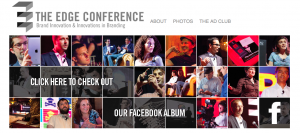 Some things make me proud to be a marketer. Some make me sigh. Still others make me wince. All were on full display last week at the 2011 Edge Conference, sponsored by the Ad Club of Boston.
Some things make me proud to be a marketer. Some make me sigh. Still others make me wince. All were on full display last week at the 2011 Edge Conference, sponsored by the Ad Club of Boston.
This annual event is designed to showcase innovations in branding. In a series of posts I’ll offer a highly subjective summary of highlights and lowlights, focused perhaps more on what they say about the current state of marketing—and humanity—than the actual items in question. Let’s start at the bottom and work our way up.
The Bad:
Obsession with coolness
Marketing at its worst is shallow coupled with stupid. We parody ourselves when trendiness trumps common sense.
Questions to the panelists had to be tweeted. When raising a human hand is too passé, obsession with social media has gone way too far. Exactly one tweeted question was used, that I could tell. Would direct engagement with the audience have encouraged more dialogue and a warmer atmosphere? Absolutely. Give me warm over cool any day.
Venue posturing: A funky nightclub too dark for taking notes or reading the agenda—whose ideal setting was this for an all-day event? When this also includes no place to sit to eat a bland boxed lunch, the Ad Club organizers did the impossible: created true longing for a Marriott conference room.
Measurable = Important
Is something important just because it can be done with a lot of data gathering and processing power? Or because it quantifies something new? Presentations by two tech startups gave me real pause, even as I salute their technical chops.
Analyzing TV content against conversations about it via social media feeds, this company probes huge data sets to reveal social structures, influence, response to stimuli, and more. Masterful and complex. And yet…
What about that data source? How valuable or representative is the subset of people tweeting or posting in real time about TV shows? Surely a very young crowd with time on their hands—a useful audience for some, but how many? In olden days this would be roughly like knowing the daytime game show audience really, really well. And so?
The underlying idea is intriguing, the technical prowess staggering. But it all hinges on the data stream: what’s publicly shared. Right now it’s drivel about drivel.
Call me a throwback, but I fear the day when we’re so externally focused and privacy-deaf that anything meaningful can be measured this whiz-bang way.
Rating people on specialized skills via crowdsourced tests, this company offers numerical scores and rankings for digital, social, and technical tools. This allows you to wear your scores (708 on Photoshop!) as a badge on FB, LinkedIn and elsewhere.
“Scores can be shared for reputation, competition and fun.” Were this just the stuff of Nerdier Than Thou posturing, I’d find it harmless. But we all know that standardized scores can be far from harmless.
Low FICO scores, even those based on inaccurate data, can prevent you from getting a home—or a job. The No Child Left Behind standardized-test juggernaut has eviscerated good teaching. Enlightened colleges are finally dropping SAT requirements, but it’s slow and sparse.
Smarterer will probably be very successful. Employers will want easy ways to classify, justify and dismiss. Meanwhile, wonderful people brimming with vital, unmeasurable skills will be blocked. That person who lightens hearts when he walks in the room may never become your colleague. That resourceful, humble person who’d sacrifice her weekend to save your project may never join your company or enter your life.
Access to easy metrics will help and harm, as blunt instruments always do. As we embrace them in the rush to simplify our lives, let us not overlook what they miss—or the widening of the gap between what can be measured and what may matter most.
Next up: The Silly



